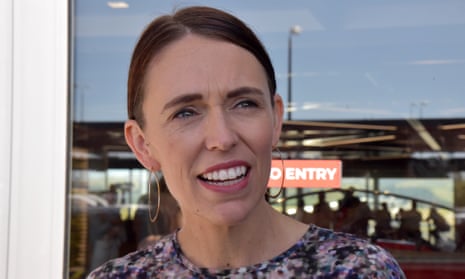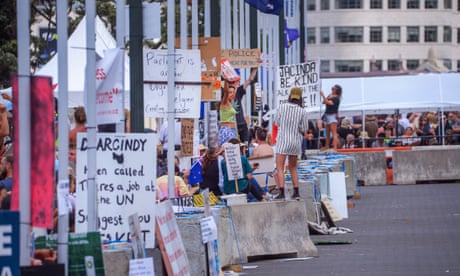Lula accuses Bolsonaro of genocide against Yanomami in Amazon

Tom Phillips in Rio de Janeiro
Sun, 22 January 2023
Brazil’s new president, Luiz Inácio Lula da Silva, has accused Jair Bolsonaro’s far-right administration of committing genocide against the Yanomami people of the Amazon, amid public outrage over a humanitarian catastrophe in the country’s largest Indigenous territory.
Lula visited the Amazon state of Roraima on Saturday to denounce the plight of the Yanomami, whose supposedly protected lands have been plunged into crisis by government neglect and the explosion of illegal mining.
“More than a humanitarian crisis, what I saw in Roraima was a genocide. A premeditated crime against the Yanomami, committed by a government impervious to the suffering of the Brazilian people,” Lula tweeted on Sunday, one day after visiting an overcrowded clinic for Yanomami patients in Roraima’s capital, Boa Vista.
Lula’s justice minister, Flávio Dino, said he would order a federal police investigation into “strong indications” the Yanomami had suffered crimes including genocide – meaning the deliberate attempt to partially or completely destroy an ethnic, national, racial or religious group.
Horrifying photographs of emaciated Yanomami children and adults emerged on the eve of Lula’s trip, laying bare the scale of the health crisis facing the territory’s estimated 30,000 Indigenous inhabitants.
“The photos really shook me because it’s impossible to understand how a country like Brazil neglects our Indigenous citizens to such an extent,” the leftist president told reporters in Boa Vista.
Lula, who became president on 1 January, blamed his far-right predecessor for forsaking Indigenous communities and emboldening the thousands of wildcat miners who flooded the Portugal-sized Yanomami enclave during Bolsonaro’s 2019-2022 government.
Those miners contaminated rivers and wrecked forests, depriving remote Yanomami communities of key food sources – fish and other animals such as monkeys and wild boars – while simultaneously spreading malaria and hampering the efforts of government health workers.
“As well as the disregard and neglect of the last government the main cause of this genocide is the invasion of 20,000 illegal miners, whose presence was encouraged by the ex-president. These miners poison rivers with mercury, causing destruction and death,” Lula wrote, pledging: “There will be no more genocides.”
Speaking before flying to Roraima with Lula, the minister of Indigenous peoples, Sônia Guajajara, said that protecting Yanomami children from outrageous levels of malaria, verminosis, malnutrition and diarrhoea was her absolute priority. “Every 72 hours a child is dying from one of these illnesses, according to the information we’ve received,” Guajajara said, calling for the expulsion of the miners in the next three months.
On Sunday another key Lula ally, former Brazilian president Dilma Rousseff, said the 570 Yanomami children who had reportedly died of hunger or mercury poisoning since 2019 were proof of the “Yanomami genocide”.
“There is a motive: the greed of the miners who invaded their lands. And there is a perpetrator: Jair Bolsonaro, who championed this invasion and denied medical assistance to the Indigenous,” Rousseff wrote on Twitter.
“All of those who are responsible, Bolsonaro included, must be prosecuted, judged and punished for genocide,” Rousseff added.
Bolsonaro denied responsibility, calling such accusations a “left-wing farce”. The former president – who is notorious for his prejudiced comments about black and Indigenous citizens - claimed Indigenous healthcare had been one of his government’s priorities.
But activists scoff at such claims, noting how Amazon deforestation rose nearly 60% thanks to Bolsonaro’s dismantling of environmental and Indigenous protection.
“It was a government of blood,” the Yanomami leader Júnior Hekurari told the Guardian last month in Boa Vista.
During a campaign visit to Roraima, before his 2018 election, Bolsonaro warned supporters that foreign rivals might invade Indigenous territories, whose creation he opposed. “Sooner or later, other powers might turn these areas into other countries,” Bolsonaro said of reserves he believed should be opened up to commercial development.
But it was illegal miners, including at least one multi-millionaire businessman with ties to Bolsonaro, who laid siege to Yanomami lands, with the estimated number of garimpeiros [small-scale miners] operating there jumping from 5,000 to 20,000 during Bolsonaro’s government.
Critics accuse Bolsonaro’s administration of doing nothing to stop the growing Yanomami disaster.
Hekurari said he had sent about 50 written pleas for help to Bolsonaro’s government as a result of the gold mining invasion and soaring levels of malnutrition, malaria and deaths. “He ignored our cry for help,” the activist tweeted on Saturday.
Brazil declares public health emergency for Yanomami people

Brazilian President-elect Luiz Inacio Lula da Silva stands with his Health Minister Nisia Trindade during an event where he announced those who will lead ministries in his upcoming government in Brasilia, Brazil, Thursday, Dec. 22, 2022. (AP Photo/Eraldo Peres)
CARLA BRIDI
Sat, January 21, 2023
BRASILIA, Brazil (AP) — Brazil’s government has declared a public health emergency for the Yanomami people in the Amazon who are suffering from malnutrition and diseases such as malaria as a consequence of illegal mining.
The decree, signed by Health Minister Nisia Trindade late Friday, has no expiration date and allows for hiring extra personnel. It determines that the team in charge has to publish reports regarding the Indigneous group’s health and general well-being.
President Luiz Inácio Lula da Silva also created a multiministerial committee, to be coordinated by his chief of staff, for an initial period of 90 days. He is traveling to Roraima state’s capital, Boa Vista, where many ill Yanomami have been admitted to specialized hospitals.
The Yanomami are the largest native group in Brazil, with a population of around 30,000 that lives in an area larger than 9 million hectares (22 million acres), in the northern area of the Amazon rainforest, close to the border with Venezuela.
In recent years, specialists had sounded the alarm about humanitarian and sanitary crisis taking shape. The report “Yanomami Under Attack,” written by the nonprofit Socio-Environmental Institute, points out that in 2021 the region was responsible for 50% of the malaria cases in the country. The same report said that more than 3,000 children were malnourished.
Illegal mining is the main root of the problems faced by the Yanomami people. Activists accuse miners of death threats, sexual violence and alcohol and drug abuse, especially against Indigenous children. The same report shows that the region had more than 40 illegal airstrips made by miners and that they had taken over some of the government health centers installed in the region.
Earlier this week, the Health Ministry had already designated a team for a special health mission in the Yanomami region. Lula scheduled an emergency trip to Roraima state following a report by independent local news website Sumauma, featuring shocking pictures of malnourished children.
According to the report, during the last four years of former President Jair Bolsonaro’s government, the death of children age 5 or less had jumped 29% in comparison to the previous government. The same report shows that 570 Yanomami children died between 2019 and 2022 from curable diseases.
Lula tweeted that the government received information on the “absurd situation” of malnourishment in Yanomami children. The president will be accompanied by several of his ministers in Boa Vista.
WHEN I TOOK ANTHROPOLOGY AT UNIVERSITY IN 1980 ONE OF THE PEOPLES WE STUDIED WERE THE YANOMAMI, THE OTHER WERE THE 'MODERN PEASANTS' OF NEWFOUNDLAND.























